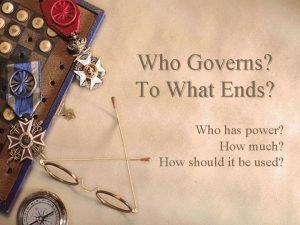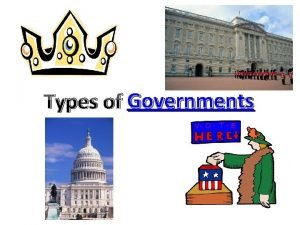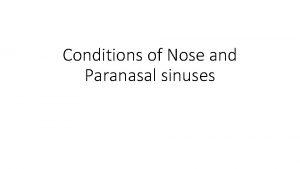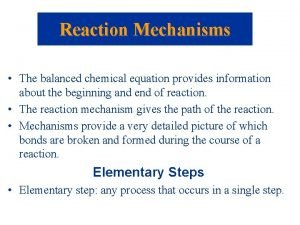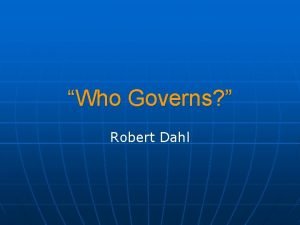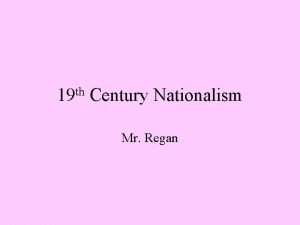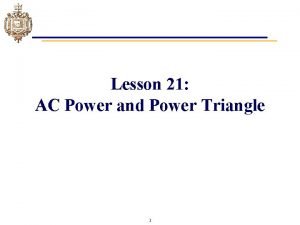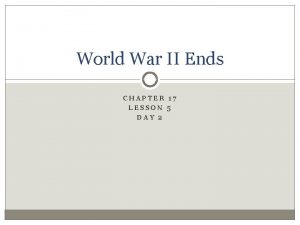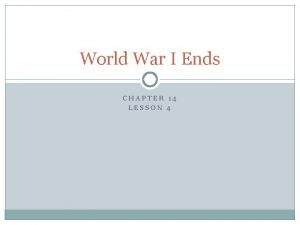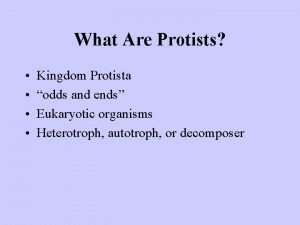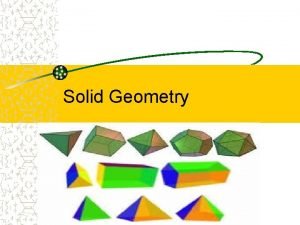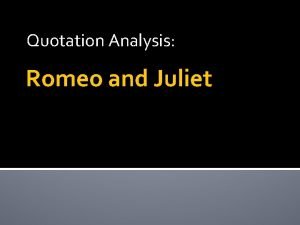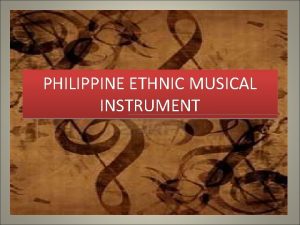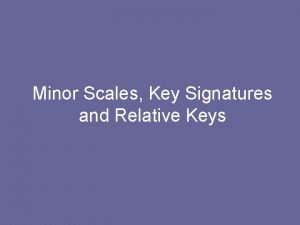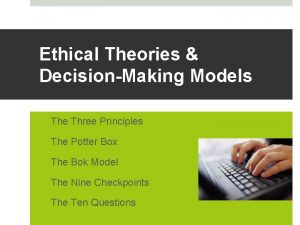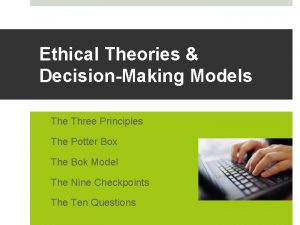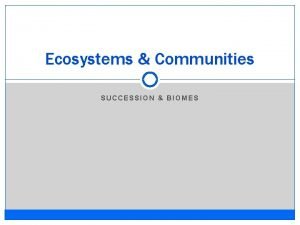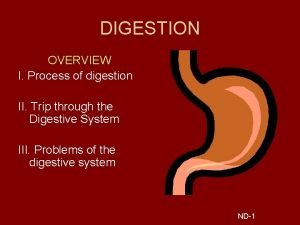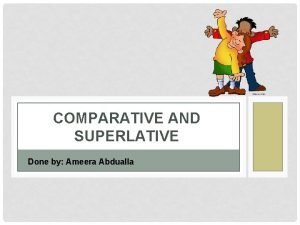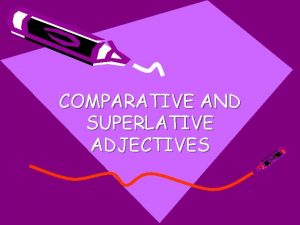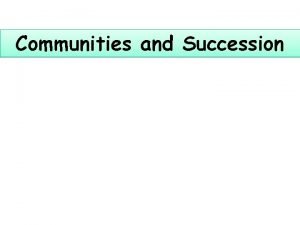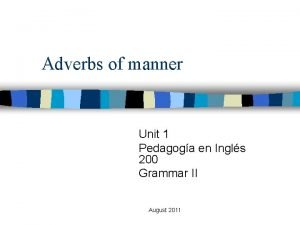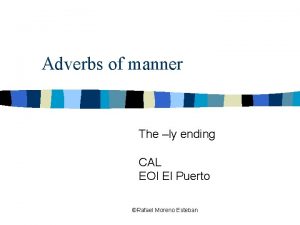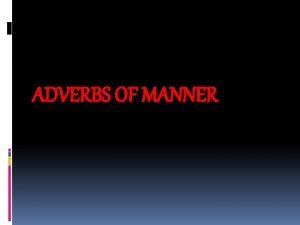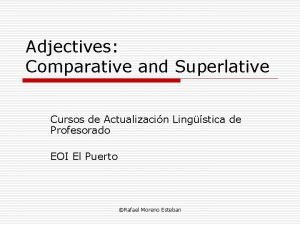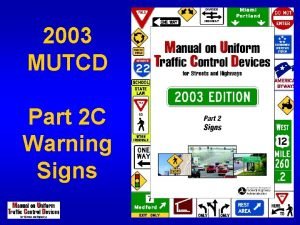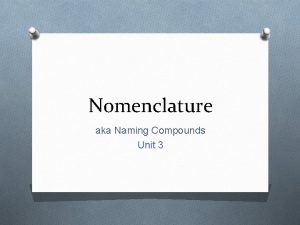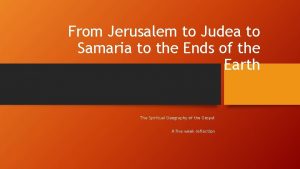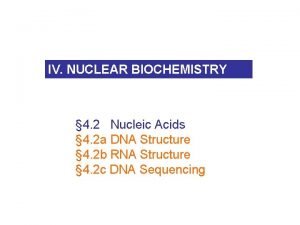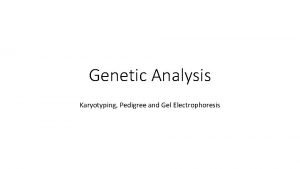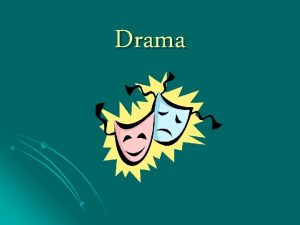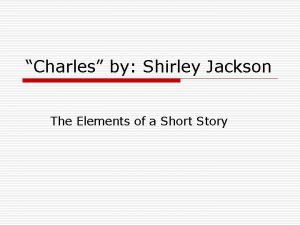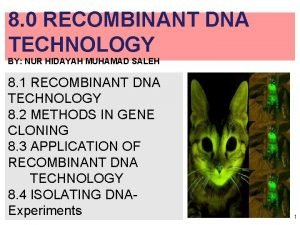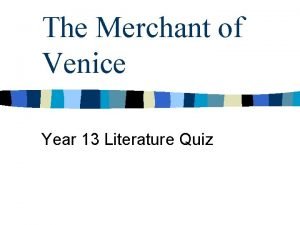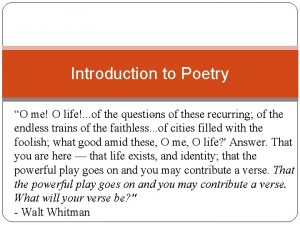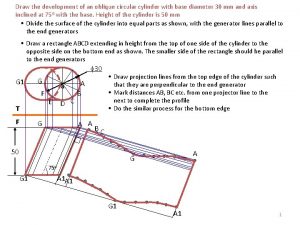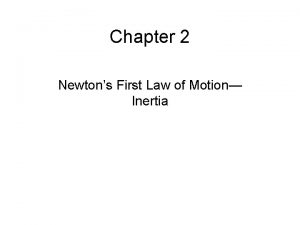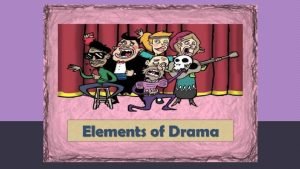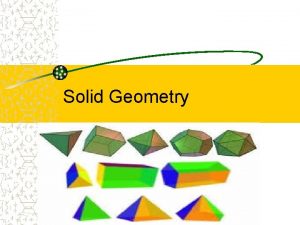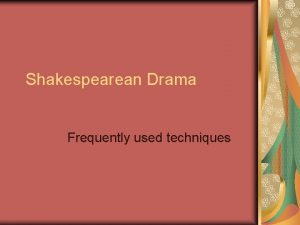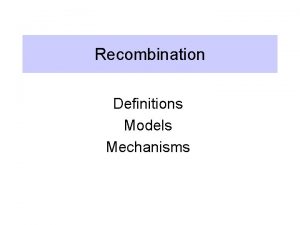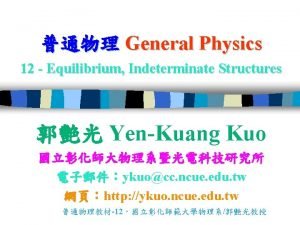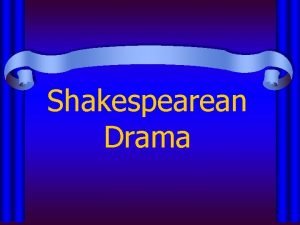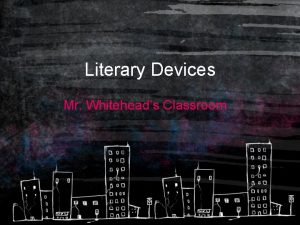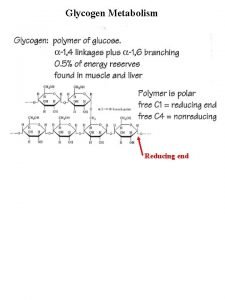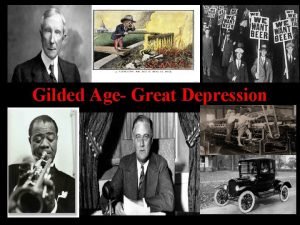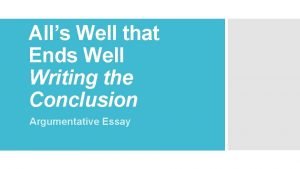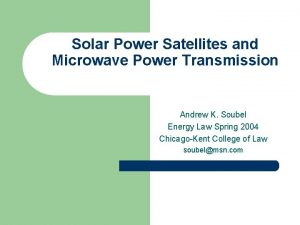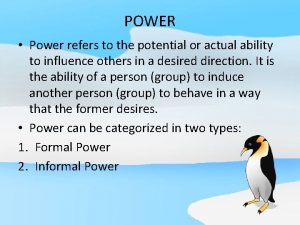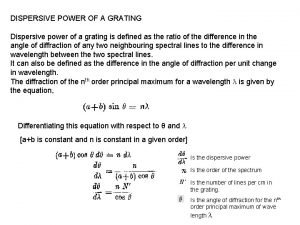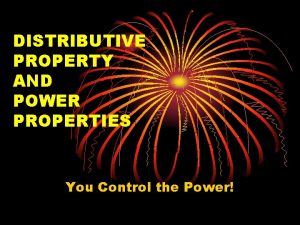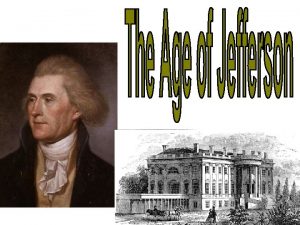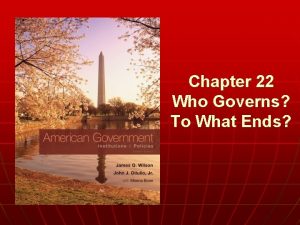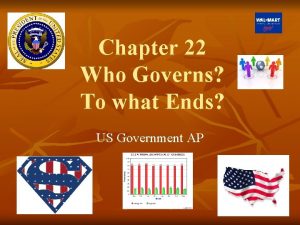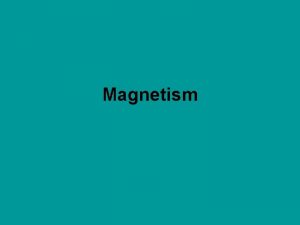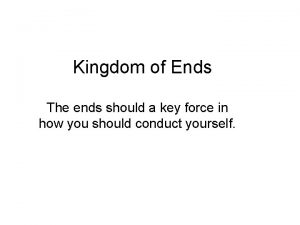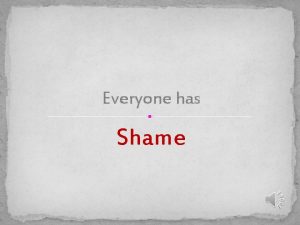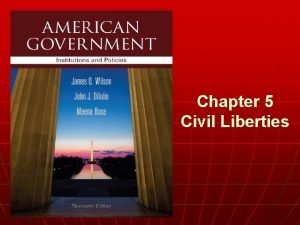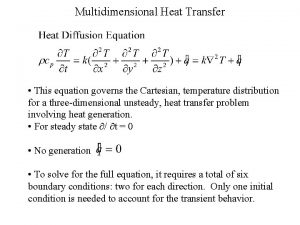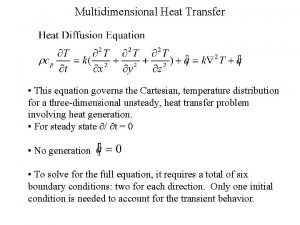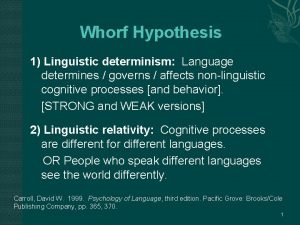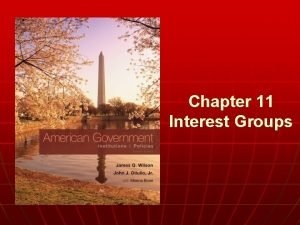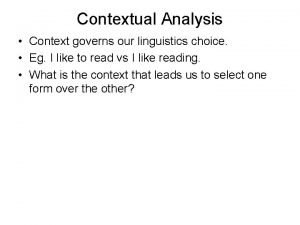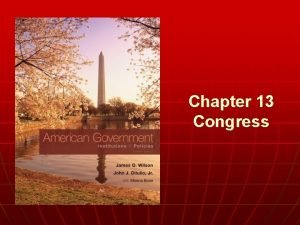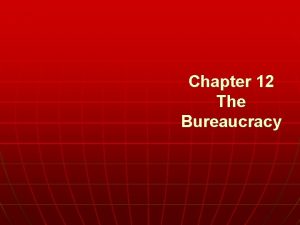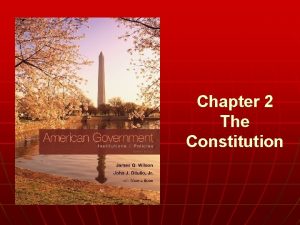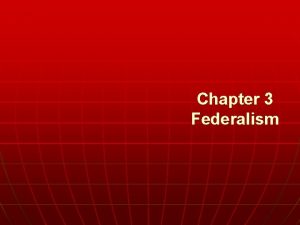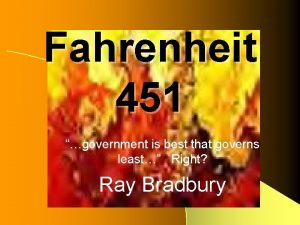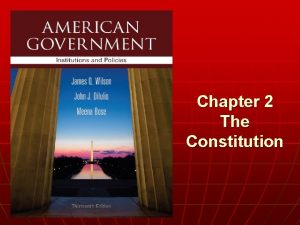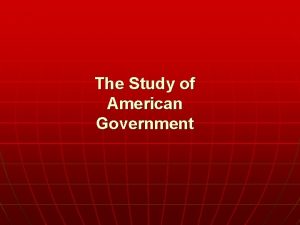Who Governs To What Ends Who has power
























































- Slides: 56

Who Governs? To What Ends? Who has power? How much? How should it be used?

Those Who Govern will affect us because they have POWER w Power: The ability to cause another person to act in accordance with your intentions w Gaining government office is a good example of using Political Power w By gaining office, a person gains some Authority, or right to use that power w That right comes from Legitimacy – a result of a law or constitution

DEMOCRATIC THEORY w Democratic theory has very strong roots in British history, although it may be traced back to much earlier civilizations, such as Ancient Greece. w Democracy is a form of government that places ultimate political authority in the hands of the people. Democratic theory has two basic models:

Direct Democracy w In this form of democracy, citizens debate and vote directly on all laws. w In Ancient Athens, the legislature was composed of all of the citizens, although women, slaves, and foreigners were excluded because they were not citizens. w Direct democracy requires a high level of participation, and is based on a high degree of confidence in the judgment of ordinary people. w Many of the Founders of the United States were skeptical about the ability of the masses to govern themselves, being too prone to the influence of demagogues (charismatic leaders who manipulate popular beliefs) and too likely to overlook the rights of those with minority opinion. w The latter leads to majoritarianism, or the tendency for government to do what the majority of people want.

Representative Democracy w The Founders chose to establish a republic, or an indirect democracy in which people elect representatives to govern them and to make laws and set policies. w This form is also referred to as an indirect democracy. In the United States, the people came to hold the ultimate power through the election process, but all policy decisions were to be made by elected officials or those that they appoint. w A representative democracy, then, is a compromise between a direct democracy and an authoritarian rule, and has become the most accepted form of democracy in the world today.

ELITE THEORY w How can a republic claim to be a democracy if only a few people actually make political decisions, even if they are elected by the people? w Elite theory holds that a “representative democracy” is not really based on the will of the people, but that there is a relatively small, cohesive elite class that makes almost all the important decisions for the nation. w Another version of elite theory argues that voters choose from among competing elites. w New members of the elite are recruited through a merit-based education system, so that the best and brightest young people join the ranks of the elite. w Elite theorists argue that the founders believed that a privileged majority should rule in the name of the people with a controlled amount of input from citizens.

PLURALIST THEORY w Another theoretical perspective is pluralism, the argument that representative democracies are based on group interests that protect the individual’s interests by representing him or her to the government. w The theory is grounded in the notion that in a diverse society such as the United States, too many interests exist to allow any one coherent group of elites to rule. w Government decisions are made in an arena of competing interests, all vying for influence and struggling to speak for the people that they represent. w Some pluralists have argued that the founding fathers represented different interests (such as rural vs. urban, or north vs. south), and that many points of view were actually represented. w The model still works today, as pluralists argue, creating strong links between government officials and their popular base.

Hobbes, Locke, & Rousseau Development of Social Contract Theory

THEORETICAL PERSPECTIVES w John Locke and other Enlightenment thinkers, such as Voltaire, Montesquieu, and Jean Jacques Rousseau, created theories of democracy, republican government, pluralism, and elitism that guided the Founders as they shaped the new government of the United States in the late 18 th century.

Thomas Hobbes (1588 -1679) w Overall Objectives: – To put moral and political philosophy on a scientific basis – Contribute to the stability, peace, and welfare of mankind

Hobbes’s Perspective w Felt that earlier thinkers (excluding Machiavelli and certain others) had failed because they attempted to base their theories of society on mankind’s highest aspirations. w Believed he had uncovered the basis of human behavior and human nature people have competing interests (“State of Nature”)

Hobbes Recommendations w To prevent chaos, society, though political and economic organization use force and coercion (carrot and stick = power) to hold society together. w Agreement to this by the members of society forms the social contract.

Social Contract w The social contract is not between the citizens and the ruling power. w It is a contract citizens make with each other to accept the rule of central authority. w The minority accepts the majority decision. w A society so united forms a single body, a commonwealth, a leviathan.

John Locke (1632 -1704) Locke’s message: – All government is limited in its powers and exists only by the consent of the governed. – All people are born free.

Locke’s Two Treatises on Gov’t w Begin with the questions: – “What is political power? – What is the appropriate end and objective of civil government? w Answers: – Political power is the right to make laws, enforcing them at penalty of death. – Establishment of penalties related to regulating and preserving property and defending the commonwealth from foreign attack, all for the public good.

The “State of Nature” w The state of nature is a state of perfect freedom and equality. w The world was never without political or social structure. Political and social structure arise naturally with humankind. w People “… living together according to reason, without a common superior on earth with authority to judge between them, is properly the state of nature. ”

Locke on Political Power w Must be limited. w Majority rule. w Separation of Powers. w There is no freedom where there is no law.

Jean Jacques Rousseau (1712 -1778) w Concerned with the relationship of the state and the individual. w Believes that society is based upon some implicit contract. w The contract implies that the ruler is the people’s agent, not their master.

Rousseau’s View of Human Nature w Civilization brought inequality and other evils to the “State of Nature”. w The key social bond has been the development of private property. – “The first man who, having enclosed a piece of ground bethought himself of saying ‘this is mine’, and found people simple enough to believe him, was the real founder of civil society. ” w Thus, Private property is the source of all evil and leads to the necessity of the establishment of society, government, and law.

“The Social Contract” w People empower the state by their contract with the ruler giving the state complete control over themselves and their possessions. w If the ruler or laws act other than in the interests of the whole of society, then the contract becomes void.

To Sum Up All this Philosophy…

Hobbes’s Social Contract w You would give up Liberty w To gain Security

Locke’s Social Contract w You would give up Your right to live in the “state of nature” w You gain Protection of certain key rights (life, liberty, property)

TWO VERSIONS OF SOCIAL CONTRACT THEORY w THOMAS HOBBES – “Every man is against every man… and the life of man is solitary, poor, nasty, brutish, and short. ” – SO, give Power to a KING to… • Enforce Laws • Punish Criminals • Defend people from invasion **SOME RIGHTS HAVE TO GO IN ORDER TO HAVE LAW AND ORDER. w JOHN LOCKE – “Life, liberty, and the enjoyment of personal property” – Meaning, GOVERNMENT EXISTS TO GUARANTEE PEOPLE’S NATURAL RIGHTS. – Power to the People • Make Laws • Agree to follow Laws • Punish Law breakers in an agreed upon way. **NO RESTRICTIONS ON CITIZENS WITHOUT THEIR CONSENT.

Republican Government w The Framers of the United States Constitution (“founding fathers”) believed in natural rights and to protect them they favored the idea of giving Power to the governed in order to minimize the abuse of Power by a king, tyrannical majority, or by officeholders. w Representative Democracy

To What Ends? What is the Function of Government?

FUNCTIONS OF GOVERNMENT w Protect People from each other and outsiders w Protection of individual rights and liberties w Provide public goods and services – Parks, monuments, environmental regulations, anti-monopoly policies, commerce, welfare, medical, agricultural law w How much national defense? How much protection for rights? How many services? – These questions are about political ideology

POLITICAL IDEOLOGIES a. k. a. Beliefs about Governance. w Liberalism (modern) – Support… • Government intervention in economy • Government sponsored social programs – Opposed to… • Government interference with personal morals or activities • To expansion of military w Conservatism – Opposed to… • Government intervention in the economy • Government sponsored social programs – Support… • Government intervention to uphold MORALITY • A Strong Military and force as a means to an end • A balanced budget • Limited taxation

w Libertarianism – Accept Locke’s emphasis on basic natural rights, accept Adam Smith’s free market ideas. – Support a VERY limited government (defense, provide liberty, free trade) w Socialism – Democratic Socialism (Germany, Britain, France, Scandinavia) • • Support democracy Support government regulation and ownership of major industries Support regulation of production and distribution Support government planning to protect citizens’ welfare – Totalitarian Socialism – Communism (in practice, not theory) (China, North Korea, former USSR) • Support for revolution against the existing system with a dictatorship of the proletariat • Support for government regulation and ownership of industry • Support for government planning to protect citizens’ welfare and interests

Classification of Political Systems a. k. a. TYPES OF GOVERNMENTS w Anarchy – Absence of government! (Lebanon 1990 s, Somalia 1990 s – today) – Liberal or Conservative? w Theocracy – Control of governance by a religion, church and/or clergy. Church law above civil law (former Tibet, Puritans in colonial New England) – Liberal or Conservative? w Pure (direct) Democracy – Direct citizen participation in daily governance (ancient Athens, colonial New England town meetings) – Liberal or Conservative?

w Representative Democracy – REPUBLICANISM – Election of government officials to manage the state (USA, many others) • Majoritarian – “will of the majority” • Pluralist – “competition of groups for superiority” • Elite – “domination by rich and powerful serving their own needs” – Liberal or Conservative? w Absolute Monarchy – Government by a monarch with absolute power descending from God (absolutism in Europe, Macchiavelli) (Louis XIV) – Liberal or Conservative? w Constitutional Monarchy – Government by a monarch with a constitution, limited monarchy (Great Britain and Denmark today) – Liberal or Conservative? w Dictatorship – Single leader rule by force, no consent of the governed at all (USSR under Stalin, IRAQ under Saddam Hussein) – Liberal or Conservative?

Which gets us back to the “Founding Fathers” (Framers)… w Between 1607 and 1733, the English founded 13 colonies on the eastern seaboard of the current USA w Each colony had its own version of democracy, in a crude form (slavery/indentured servitude and no representation for women) w However, the colonies established a strong democratic pattern with the following features: – WRITTEN CONSTITUTIONS – LEGISLATURES OF ELECTED OFFICIALS – SEPARATION OF POWERS BETWEEN THE EXECUTIVE (GOVERNOR) AND THE LEGISLATURE

w In 1776, the colonies declare independence from England become an independent nation w They establish a limited confederation of states – ARTICLES of CONFEDERATION • each colony (now state) was independent and with few limitations • System did not work: – Congress can’t tax or regulate commerce – Absence of a national Judicial system and NO Executive – One vote per state regardless of population • BANKRUPTCY • TRADE WARS

Founding Fathers Come Together to Form the “More Perfect Union” The Building of the American Constitution

It’s a POWER problem… w The new nation was struggling with Who Governs and To What Ends w Should a strong national government be formed to ensure the good of the entire group of states? How could it be kept from being tyrannical? How would a strong central government enforce individual rights and allow state and regional differences?

Solution? FEDERALISM w Compromise (“The Great”) allowed all states to share sovereignty with national government w National government took supremacy over many matters including commerce, defense, civil liberties, etc. w State governments took supremacy over issues of great local importance including education, etc. w Federalism in America is a combination of confederal (unitary) and federal theories:

The Constitutional Convention May 1787, Philadelphia w Fifty-five (55) white, Protestant, wealthy males of varying education w Future presidents, state governors, Chief Justices, and Revolutionary War veterans w Shared a belief in the English system – Magna Carta (1215) – English Bill of Rights (1689)

Enlightenment Thinking w Locke, Montesquieu, Rousseau – Principles: Social Contract, Power is Derived from the Consent of the Governed, Separation of Powers, Checks and Balances, Right to Vote w Declaration of Independence – Equality – Inalienable rights • Life • Liberty • Pursuit of Happiness

Evidence of Framer’s Fear of Power to The People w Senators selected by state legislatures w President selected by Electoral College w Amending Process to the Constitution – Proposal by two-thirds of Congress or state conventions – Ratification by three-fourths of state legislatures or state conventions

Basic Principles of the Constitution 1. 2. 3. 4. Representative Government Federalism Separation of Powers Checks and Balances

Representative Government w Selection of representatives in “free” and scheduled elections w Governance by the “consent of the governed”

Federalism – The American Version w Division of power between national, state, and municipal governments w Compromise between dictatorial national government and independence of the states w Historically, the national government continues to gain power: – Expressed Powers: “enumerated” in the Constitution – Implied Powers: “suggested” in the Constitution – Inherent Powers: certain powers which all independent nations have; i. e. foreign policy matters

Why is the National Government getting stronger? w w Many problems are of a national nature States need the national government for $$ Unequal distribution of wealth among and within states Inability or unwillingness of states to deal with certain problems w “Statements of power” to the national government from the Constitution: – – General Welfare clause Commerce Power Defense of the Nation Necessary and Proper clause – elastic clause w Courts have slowly and methodically taken away states constitutional rights

Duties of the National Government w w Guarantee territorial integrity of the states Guarantee a republican form of government Protect each state from invasion Protect against domestic violence within states – – – 1894 Pullman Strike 1957 Little Rock Crisis 1962 University of Mississippi 1963 University of Alabama 1992 L. A. Riots w Assist with natural disasters – 2006 Katrina w Congress chooses to admit new states

Powers Denied to the States w w w w w No coining or printing of money No tariffs No troops in peacetime No signing of treaties with other nations without Congressional consent No slavery (13 th Am. ) No depriving of life, liberty, property without due process (14 th Am. ) No denial of vote on basis of race (15 th Am. ) No denial of vote on basis of gender (19 th Am. ) No power to destroy the federal system (Civil War? ) – No “NULLIFICATION”

Powers and Responsibilities of the States w NO ENUMERATED POWERS IN THE CONSTITUTION (10 th Am – “powers not given to national government are reserved to the states”) w Education w Marriage w Voting w Property Laws w Public Safety Laws w Welfare w Establishment of local governments w State taxes

Concurrent Powers shared by National and State Governments w Powers not denied to the states or given to the national government w Collecting Taxes w Making and enforcing laws w Borrowing and spending $$ w Regulating Commerce w *Education w *Welfare w *Highway Construction w *Urban Renewal

Separation of Powers w Insures against any one branch from gaining too much power w Different constituencies for different branches of government w Different terms of office for different branches of government

Checks and Balances w Executive (Presidency) – Checks on Congress • Propose legislation • Veto legislation – Checks on Judiciary • Appoints federal judges • Enforces court decisions (or not!) w Legislative (Congress) – Checks on Executive • Override veto • Impeachment • Ratify treaties / justices / budget – Checks on Judiciary • Impeachment / Confirmation • Amendments w Judiciary (Federal Courts) – Check on Executive • Review of Presidential Actions / Behavior – Check on Legislature • Judicial Review

This Uniquely American System is embodied by the Constitution of 1789 – at the time a very controversial document w Supporters were called Federalists – James Madison – Alexander Hamilton – John Jay w Emphasized importance of a strong central government (unitary) to improve on the problems of “the Articles” w Published “Federalist Papers” in New York w Opponents were known as Anti-Federalists – Patrick Henry – John Hancock – Samuel Adams w Opposed surrendering state powers to the central government w Concerned about the return of a strong Executive (King George paranoia) w Argued for a Bill of Rights to counteract the strong national gov’t.

THE LIVING CONSTITUTION A document to create “Government for the Ages” A Video Biography by Yale Professor of Government Akhil Reed Amar

The Constitution Lives! The Framers brilliantly created a document that has evolved over time, allowing it to adapt to societal changes. 1. Elastic Clause 2. Amendments 3. Informal Methods

The Elastic Clause Article I, Sec. 8, Line 18 w “To make all laws which shall be necessary and proper for carrying into execution the foregoing powers, and all other powers vested by this Constitution in the government of the United States, or in any department thereof. ” w Constitution evolves as National Government sees more opportunities to make “necessary and proper” laws.

Amendment Process w Only FORMAL way to “change” the constitution. w Requires a two-thirds (2/3) vote of the entire Congress w Three-quarters (3/4) of state-wide legislatures must ratify

Informal Ways to Amend/”Change” The Constitution w Actions of Congress – Passage of laws, i. e. creation of Federal court system, agencies, commissions w Actions of the Executive – Foreign policy, commander in chief power w Actions of the Courts – JUDICIAL REVIEW w Actions of Political Parties – Party Arrangement and Division in Cogress w Unwritten Traditions – Precedent of two-term presidency – Creation of “The Cabinet” – Congressional Committee System

Structure – in Brief! w Article I – Legislative – Bicameral House – Power to make laws, taxes, etc. – ELASTIC CLAUSE (sec. 8, line 18) w Article II – Executive – Law Enforcer, Commander-in-Chief, etc. w Article III – Judiciary – Supreme Court and Lower Federal Courts w Article IV – Miscellaneous Guarantees – Guarantee of republican form of government w Article V – Amendments w Article VI - Recognition of “Supreme Law” w Article VII - Ratification
 Who governs and to what ends
Who governs and to what ends Constitutional monarchy pros and cons
Constitutional monarchy pros and cons Preseptal cellulitis
Preseptal cellulitis What law governs the balancing of chemical equations
What law governs the balancing of chemical equations Dahl who governs
Dahl who governs It must be love of fatherland that governs
It must be love of fatherland that governs Power triangle
Power triangle Lesson 5 world war ii ends
Lesson 5 world war ii ends Chapter 27 lesson 4 world war 1 ends
Chapter 27 lesson 4 world war 1 ends What is the odds and ends kingdom
What is the odds and ends kingdom Solid
Solid Friar laurence character traits
Friar laurence character traits What is kudyapi classification
What is kudyapi classification Battle ends and down goes
Battle ends and down goes Ends based thinking
Ends based thinking Ends based thinking
Ends based thinking Ends in a climax community
Ends in a climax community The end of the digestive system
The end of the digestive system Peaceful superlative
Peaceful superlative Comparative superlative lucky
Comparative superlative lucky Climax community
Climax community Ends in a climax community
Ends in a climax community Adjective ends with y
Adjective ends with y Adverb ending in y
Adverb ending in y Adjective y
Adjective y Comparative form of peaceful
Comparative form of peaceful Mutcd part 2
Mutcd part 2 The name of a binary compound ends with _____.
The name of a binary compound ends with _____. Jerusalem judea samaria and the ends of the earth
Jerusalem judea samaria and the ends of the earth Teori means-ends scheme
Teori means-ends scheme Restriction ends
Restriction ends Nondisjunction
Nondisjunction What is drama
What is drama What is restriction digestion
What is restriction digestion What is the theme of charles by shirley jackson
What is the theme of charles by shirley jackson Sticky ends
Sticky ends Sticky ends
Sticky ends Shakespeare these violent delights
Shakespeare these violent delights How was shylock punished by the law
How was shylock punished by the law Shel silverstein where the sidewalk ends
Shel silverstein where the sidewalk ends Gb3fc
Gb3fc When burl and paul stand on opposite ends
When burl and paul stand on opposite ends What is drama/play
What is drama/play A solid object with two identical ends and flat sides
A solid object with two identical ends and flat sides A play that ends unhappily
A play that ends unhappily Break definition
Break definition Statically indeterminate beam fixed at both ends
Statically indeterminate beam fixed at both ends Tragedy is a drama which ends on
Tragedy is a drama which ends on Poetic devices in where the sidewalk ends
Poetic devices in where the sidewalk ends Glycogen reducing end
Glycogen reducing end Great war ends
Great war ends How to write a conclusio
How to write a conclusio Solar power satellites and microwave power transmission
Solar power satellites and microwave power transmission Potential power
Potential power Flex power power supply
Flex power power supply The dispersive power of grating is
The dispersive power of grating is Power of a power property
Power of a power property
